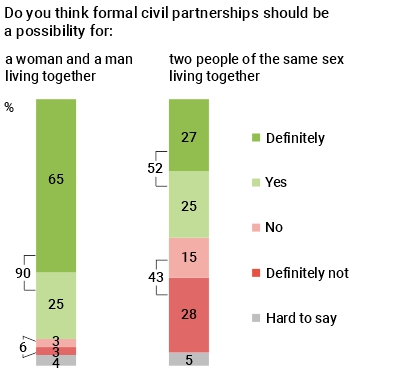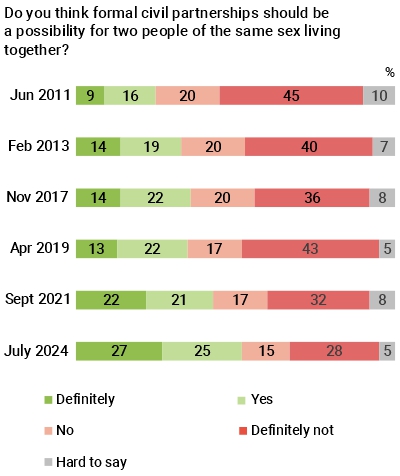15/2024
2024-08-05
Civil Partnerships: Yes or No?
Attitudes to civil partnerships differ depending on whether these are to be partnerships between people of the same sex or opposite sexes. An overwhelming majority of people (90%) agree to civil partnerships between a woman and a man, with only 6% being against. However, only just over a half (52%) would legalise such partnerships between people of the same sex, and over two fifths (43%) think this should not be possible.

|
CBOS has been asking people about their attitude to civil partnerships since 2011. Legalising heterosexual relationships in this way has never been controversial, with the highest level of objection, recorded in 2013, only reaching 11%. When it comes to same-sex relationships, however, all previous surveys have shown a predominance of opposition to such civil partnerships, though this has declined over time. There has been a simultaneous rise in support for them, with approval virtually doubling since the first survey. Further, comparing the current survey to the previous one in 2021, the percentage of those in favour has risen by 9 percentage points, with the percentage of those against dropping by 6 points, making this the first time since CBOS records began when approval for same-sex civil partnerships is greater than opposition to them.

|
More on this subject in the CBOS report.
This ‘Current Events and Problems’ survey (411) was conducted using a mixed-mode procedure on a representative sample of named adult residents of Poland, randomly selected from the National Identity Number (PESEL) register. Respondents independently selected one of the following methods: Computer Assisted Personal Interview (CAPI); Computer Assisted Telephone Interview (CATI), respondents receiving researchers’ telephone numbers in an introductory letter from CBOS; Computer Assisted Web Interview (CAWI), where respondents filled in the online questionnaire independently, gaining access by means of a login and password provided in an introductory letter from CBOS. In all three cases the questionnaire had the same structure and comprised the same questions. The survey was carried out between 4 – 14 July 2024 inclusive on a sample of 1076 people (61.9% using the CAPI method, 23% CATI and 15.1% CAWI).CBOS has been conducting statutory research using the above procedure since May 2020, stating in each case the percentage of personal, telephone and internet interviews.





